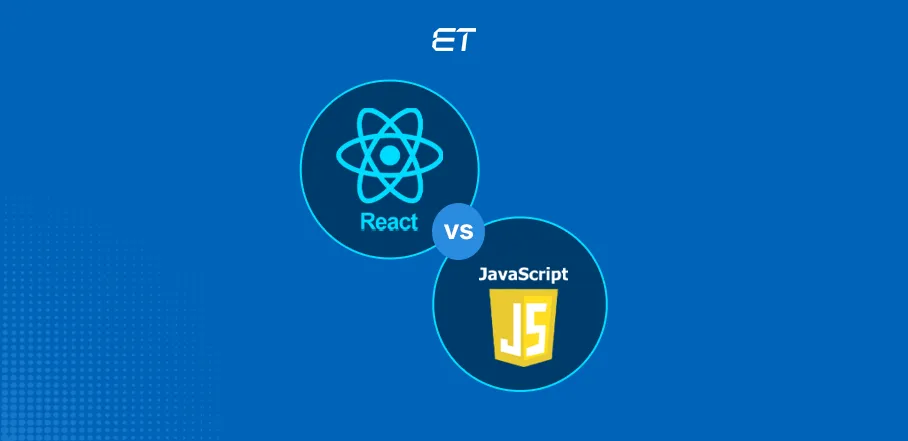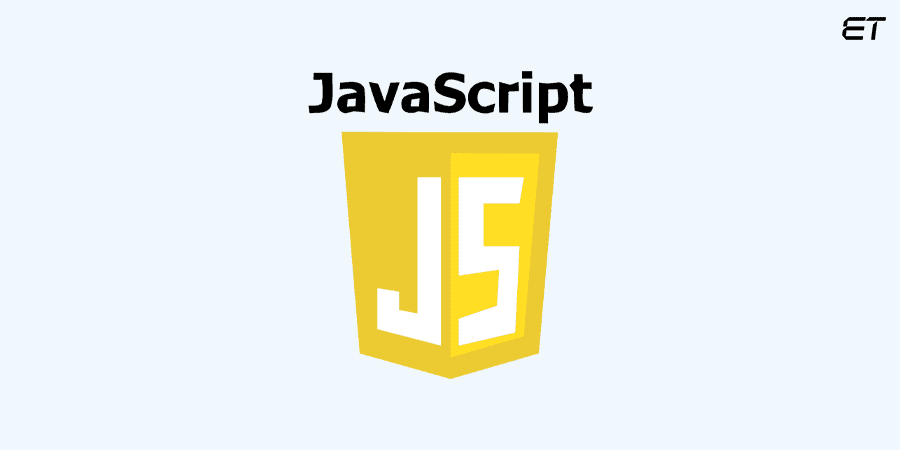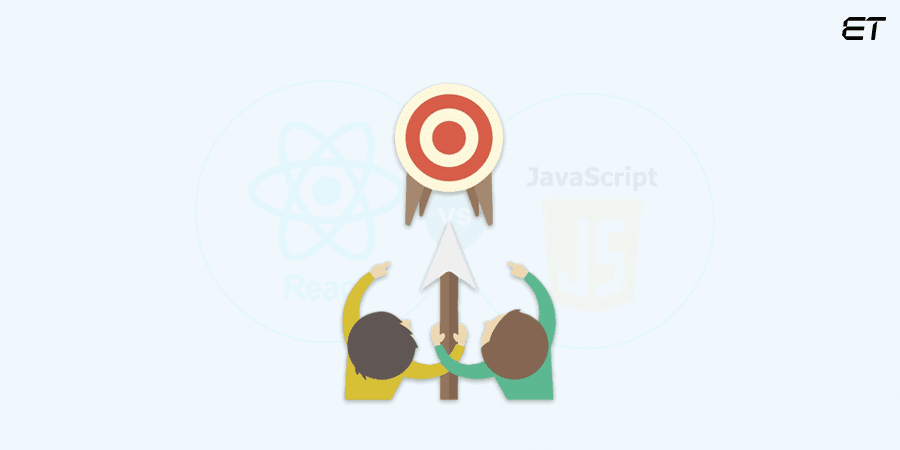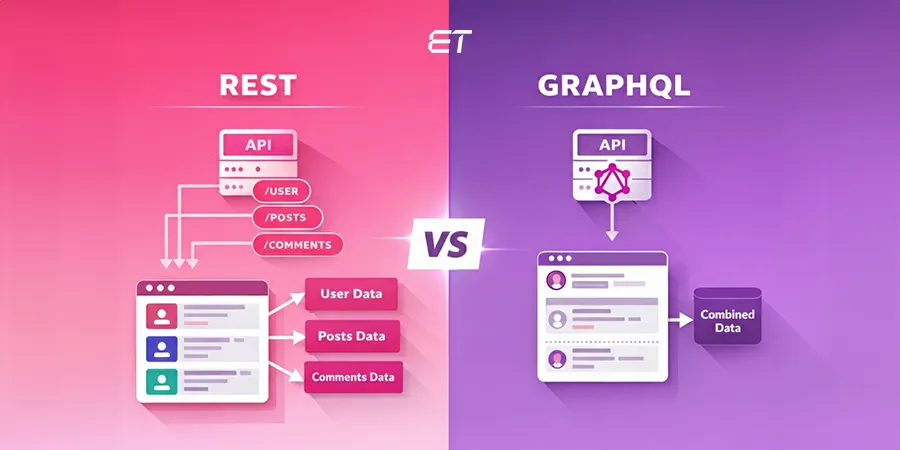
React vs JavaScript: The Ultimate Comparison
The tech world is full of interesting face-offs. Power Apps vs Power Pages, GitLab vs GitHub, Blazor vs React, and many topics help businesses make the right choice. Similarly, the React vs JavaScript comparison finds a distinct identity.
While React and JavaScript might seem similar, they belong to different categories. React is a tool (or library) that helps you build a website’s front end (what you see), while JavaScript is the programming language that makes it work.
However, the React JS vs JavaScript face-off exists for a reason, and this blog will help you understand the main factors. Read ahead to get all the crucial details and choose the most suitable option.
React vs JavaScript: A Quick Look at the Two Technologies
Let us proceed in the JavaScript vs React comparison by covering the fundamentals.

React is a powerful JavaScript library that creates interactive and dynamic user interfaces (UI) for web applications. You can consider it a toolkit that provides an organized way to build the front end of a website.
Here are the key features of React:
- Components: React breaks down UI into smaller, reusable pieces called components
- JSX: This is a syntax extension for JavaScript that allows you to write HTML-like code making it more intuitive to create UI elements
- Virtual DOM: React uses a virtual DOM to update the UI
- State Management: It helps you manage the data (or state) of your application, allowing you to update the UI dynamically based on user actions or other events
All in all, React provides a strong framework for building modern websites and applications with a focus on performance, reusability, and maintainability.
Now, let us move on to understanding JavaScript. Simply put, JavaScript is a programming language useful for adding interactivity, dynamic content, and functionality to websites.

The key aspects of JavaScript are as follows:
- Client-Side Scripting: JavaScript primarily runs on the user’s web browser, allowing for real-time interactions and dynamic content without requiring a full-page reload
- DOM Manipulation: It can interact with the Document Object Model (DOM), the structure of a web page, to modify its content, style, and behavior
- Asynchronous Programming: JavaScript enables efficient handling of multiple tasks simultaneously without blocking the execution of other code
- Event Handling: This programming language allows you to respond to user actions like clicks, keystrokes, and mouse movements, creating interactive experiences
In summary, JavaScript provides tools that are apt for creating dynamic, interactive, and engaging websites.
Need dedicated React developers to handle your front-end needs? Hire our team to kickstart your project.
React vs JavaScript: A Head-to-Head Comparison
The main question in any comparison is – how is option one different than option two? In this section, we will explain five crucial points that define the JavaScript vs React topic.
1. Purpose

React’s main purpose is to build user interfaces (UIs) for web applications. It excels at creating dynamic and interactive components that make up a website’s front end.
On the other hand, JavaScript is a general-purpose programming language with a wider scope. You can use it for various tasks like server-side development, game development, building web UIs, and more.
Refer to the following table that simplifies this React vs JavaScript comparison point:
| Feature | React | JavaScript |
| Primary Focus | User Interface (UI) Development | General-Purpose Programming |
| Scope | Building components, managing state | Server-side development, game development, and more |
| Usage | Front-end development | Both front-end and back-end development |
| Specialization | UI-centric | Versatile and adaptable |
When to Choose?
If your main goal is to build a visually appealing user interface for a web application, React is an excellent choice. On the contrary, if you need a versatile language for an extensive range of tasks JavaScript is the better option.
2. Scope

Since React focuses on building user interfaces, its scope is limited to creating components and managing their states.
JavaScript can be useful for various tasks that define the utility of a versatile programming language. Refer the following table for a direct idea:
| Feature | React | JavaScript |
| Focus | User Interface Development | General-Purpose Programming |
| Scope | Limited to UI components and state | Can be used for a wide range of tasks |
| Applications | Web applications, mobile apps (with React Native) | Server-side development, game development, and more |
| Flexibility | Less flexible compared to JavaScript | More flexible and adaptable |
When to Choose?
React is well-suited for building complex single-page applications (SPAs). On the other hand, you should choose JavaScript for tasks like building server-side applications, developing games, or working on data-intensive projects.
3. Architecture

React has a component-based architecture. So, this library focuses on reusability and modularity. It encourages breaking down user interfaces into smaller, self-contained components.
JavaScript, on the contrary, is a more flexible language that finds utility in various architectural patterns, including object-oriented, functional, and modular. Here is a relevant table that defines this React vs JavaScript point:
| Feature | React | JavaScript |
| Architecture | Component-based | Flexible, can use various patterns |
| Modularity | Highly modular, promotes code reusability | Can be modular but requires more structure |
| Structure | Well-defined component structure | Can be structured in various ways |
| Maintainability | Easier to maintain due to modularity | Can be more challenging to maintain without proper structure |
When to Choose?
If you prioritize code reusability, maintainability, and a well-defined structure for your UI, React’s component-based architecture is a great choice.
Similarly, JavaScript can be a good option if you need more flexibility in your architecture and have experience working with different patterns. However, careful planning and structure are required to maintain code quality and readability.
Do you want to get all the vital details on front-end architecture? We have the best resource for you.
4. Syntax

React uses JSX, a syntax extension for JavaScript that allows you to write HTML-like structures within the code. This aspect makes it more intuitive to create UI elements.
JavaScript utilizes standard JavaScript syntax, which is similar to other programming languages like C and Java. So, the React JS vs JavaScript syntax differentiation is quite straightforward to comprehend. Here is a quick tabular reference:
| Feature | React | JavaScript |
| Syntax | JSX | Standard JavaScript |
| Readability | More readable for UI elements | Can be more verbose for UI elements |
| Learning Curve | Slightly steeper due to JSX | Generally easier to learn |
| Flexibility | Less flexible compared to standard JavaScript | More flexible |
When to Choose?
The choice is simple. If you prefer a more intuitive syntax for creating UI elements and are willing to learn JSX, React is a good option. On the flip side, if you are comfortable with standard JavaScript syntax and do not mind the additional verbosity for UI elements, JavaScript can be useful.
5. Ecosystem

React has an extensive ecosystem of libraries, tools, and frameworks for web development. Some popular names include tools like Redux for state management, React Router for routing, and Storybook for component development.
Alternatively, JavaScript is a more general-purpose language with a larger ecosystem of tools and libraries. While there are many JavaScript-specific tools, not all of them are helpful or focus on React development.
The following table will simplify this React vs JavaScript comparison facet:
| Feature | React | JavaScript |
| Ecosystem | Specialized ecosystem for React | Broader ecosystem for general-purpose JavaScript |
| Tools | Many React-specific tools for state management, routing, etc. | More general-purpose tools |
| Learning Curve | Can be steeper due to the specialized ecosystem | Generally easier to learn due to the broader ecosystem |
| Integration | Often easier to integrate with React-specific tools | May require more customization for integration |
When to Choose?
Yet again, the verdict for this comparison point is simple. Choose the former if you prefer a well-integrated ecosystem with tools designed for React development. Conversely, JavaScript’s ecosystem can be a good option if you have experience with a broader range of tools and prefer more flexibility.
With a team of 150+ developers, we can handle development projects relevant to any ecosystem. Get in touch with us for further discussion.
React vs JavaScript: A Straightforward Summary
Understanding the five differentiating factors will help you make the right choice between React and JavaScript. However, to save time, you can always refer to the following points, which condense the technical information.
React:
- Primarily useful for developing user interfaces
- Has a component-based architecture
- Uses JSX syntax
- Specialized ecosystem with React-specific tools
JavaScript:
- A general-purpose programming language
- Useful for various tasks, including server-side development and game development
- Uses standard JavaScript syntax
- Broader ecosystem with more general-purpose tools
So, there is no clear winner in the React vs JavaScript face-off. The choice depends on your project’s purpose and scope. If you want guided assistance on such technologies, feel free to drop in your requirements. Our team of dedicated developers is adept at solving any potential dilemma (like React vs JavaScript) and helping you choose the technology that suits your necessity.
Frequently Asked Questions
1. What are the benefits of React?
React offers a component-based architecture, efficient virtual DOM, and a large ecosystem of tools, making it easier to build complex user interfaces. So, you can choose this framework to create a front-end that engages your target audience.
2. What are the advantages of JavaScript?
JavaScript is a versatile language that allows you to create dynamic web pages, server-side applications, and more. It also has broad support and a vast community. You can leverage these aspects for an efficient web development experience.
3. Who wins in the React vs JavaScript comparison?
The ‘winner’ in the React vs JavaScript comparison depends on your unique needs. React is a phenomenal choice for building user interfaces, while JavaScript offers a more general-purpose approach. So, your project’s requirement significantly influences the two options.
4. Should I learn JavaScript before React?
Learning JavaScript before React can provide a strong foundation for specialized front-end development. JavaScript is the underlying language of React, so understanding it can help you grasp React’s concepts more easily.





